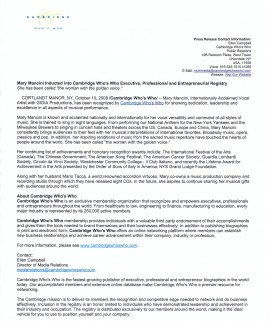January 2023 – Mary & Mario were featured in an article by Thomas Staudter in the Croton Gazette:
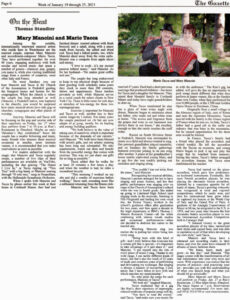
Click here to view the article in a new window: staudter article jan 2023
October 2022 – Mary & Mario were honored by NYS Sen. Peter Harckham for Italian American Month!
Harckham Honors Three Area Musical Artists at Italian American Heritage Month Celebration
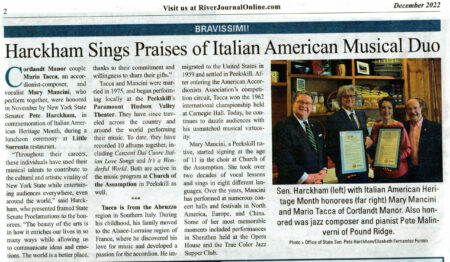
January 26, 2020 – Mary & Mario were recently featured in a Brazilian newspaper to promote their performance at the Teatro Benigno Gaiga in Pocos de Caldas, Brazil:
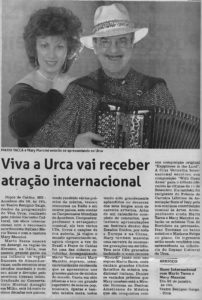
Mario was quoted in a New York Times article about NYC’s famed Music Row:
Accordion Store’s Departure Signals End of Manhattan’s Music Row
By PATRICK McGEEHAN – JAN. 3, 2016
Alex Musical Instruments, the last musical instrument shop on a block in Manhattan once celebrated as Music Row, at its new location on West 54th Street. Credit Ramsay de Give for The New York Times
For decades, musicians from around the world flocked to a segment of West 48th Street in Manhattan that was known as Music Row. Both sides of the block, just off Times Square, were lined with shops that sold and repaired guitars, drums, keyboards and other instruments.
But the music finally died there in December when the last holdout, Alex Carozza, packed up his accordion store and 50 years of memories and moved off the block. Now, all that is left of Music Row are the signs and awnings that beckoned to virtuosos and neophytes alike. The block is haunted by empty buildings and the occasional tourist straining for some echo of its harmonious past.
Where once there were Manny’s and Rudy’s and New York Woodwind and Brass, Frank Wolf Drummers Supplies and We Buy Guitars, now there are demolition crews, “for rent” notices and a construction office for the glass tower going up around the corner.
“Musically, it’s kind of depressing,” Mario Tacca, an accordion player and longtime patron of Music Row, said. “I guess it’s part of the new world that we’re living in. The old world is kind of disappearing slowly. It’s kind of sad to see.”
Music Row’s demise was a long time in coming, brought on by the soaring value of real estate and the conveniences offered by the Internet — those modern forces that have reshaped so much of New York City’s commercial landscape. The earthbound merchants of musical instruments that have survived are scattered about the city now: Rudy’s guitar shop to SoHo, Sam Ash’s superstore to 34th Street, Jon Baltimore’s horn store to 46th Street.
Mr. Tacca said he had not yet visited Mr. Carozza’s new location, tucked into an office building on a block of West 54th Street filled with the standard Midtown mix of restaurants, hotels, a bank branch and a gym. But when he does, he will not have to stand in line.
In the middle of a weekday just before Christmas, there were no customers to interrupt Mr. Carozza, 88, as he reminisced about the heyday of Music Row, when his shop employed 30 people and took in as much as $40 million a year.
“I used to sell 10, 15 accordions a week,” he said, adding that “my wife used to count the money all day.” But now, sitting in a cramped office wedged into the scaled-down version of Alex Musical Instruments, he said, “If you sell one, it’s like, hallelujah!”
Mr. Carozza, who was born in Italy, moved from Argentina to New York in the 1960s to be part of the city’s thriving music scene. He went to work in an accordion store on 48th Street and eventually opened his own shop on the block.
Not long after, Rudy Pensa left Argentina to pursue his dream of finding a place for himself on Music Row. “Everyone who was coming to America was coming to 48th Street,” he recalled. “Every band I was really watching and reading about, you found out they were coming to this place called 48th Street.” In 1972, he arrived and looked up Mr. Carozza, who hired him. “I came with a hundred bucks and a guitar,” Mr. Pensa said.
Before long, Mr. Pensa was on his way to being a purveyor of guitars to the stars. He opened his own shop, which came to be known as Rudy’s, in the 1970s. He kept it going for four decades until rising rent and a growing downtown clientele spurred him to leave the block for good in August.
Still, Mr. Pensa, 66, remains wistful about the object of his childhood daydreams.
“It was a big family there,” he said. “I used to know everyone. It was really beautiful, man.”
It took no prodding to get Mr. Pensa to wax nostalgic about Music Row. “It was an experience,” he said. “You would go store to store. It was beautiful because everybody had different things.”
Tourists and wide-eyed teenagers would wander the block hoping for a brush, or at least a glimpse, of a famous musician. They traded tales of spotting Jimi Hendrix, Pete Townshend and other rock stars ordering instruments for their next tours.
But not everybody received a warm reception. Some New Yorkers remember how brusque the salesmen could be. “They used to be so rude, it was unbelievable,” Mr. Pensa said. Before they would let a customer handle a guitar, he recalled, “They would ask you, ‘Hey, do you have the money? Show me the money.’ ”
He remembered going into Manny’s Music in the 1970s, when the Times Square area was a more treacherous place, with his money tucked into his belt, “basically in my underwear.” As soon as he inquired about a guitar, he said, he was immediately asked to prove he could afford to buy it. “It was rude,” he said.
That attitude, he said, was one of the reasons he decided to open his own shop, which he originally called the Music Stop, then Rudy’s Music Stop, and eventually just Rudy’s. It thrived even though it practically faced Manny’s, an emporium of stringed instruments that was one of Music Row’s main draws.
David Amlen, who loitered on Music Row in his youth and now operates a recording studio, MSR Studios, on the block, said even budding superstars could get a bum’s rush. He recounted a story about the jazz guitarist George Benson being told: “Dude, you have got to leave. Either buy something or get out.”
MSR, a relative newcomer to Music Row when it arrived in 2005, is “the last man standing,” Scott Kubrin, who manages the studios, said. But it has no retail component. It provides space for performers of all sorts, including the casts of Broadway musicals, to record their work.
“It’s definitely depressing” to be surrounded by the ghosts of Music Row, Mr. Amlen said. “What was nice was if somebody was working here and said, ‘Hey, I need a guitar string or a drum head,’ they could just literally run across the street and buy one.”
Now, he said, he would send a runner as far as Sam Ash, about 15 blocks away.
Developers have bought up most of the surrounding property with designs on building hotels and office buildings, but, Mr. Amlen said, “We’re not going anywhere.”
Mr. Carozza capitalized on the demand for prime lots in Midtown years ago. After buying a building on Music Row for about $500,000 in the late 1970s, he sold it in 2008 for $33 million.
Hoping for a similar score, Mr. Pensa repeatedly offered to buy the building that housed his shop, he said. But his former landlord rebuffed him, saying, “Rudy, Rudy, Rudy, I don’t buy guitars, you don’t buy buildings.”
Mr. Pensa and others pegged the decline of Music Row to the closing of Manny’s in 2009. Without Manny’s, Music Row was reduced to a half-block of stores, most of which had common ownership.
In the end, Mr. Pensa’s new landlord wanted to double the rent on 48th Street. Mr. Pensa balked, telling him that “nobody comes here anymore.”
“I would have loved to stay on 48th if more people had stayed,” he said. “What are you going to do? Nothing lasts forever.”
Besides, Mr. Pensa said, in SoHo he is closer to the lofts occupied by many of the stars of both stage and screen who can afford the expensive guitars he specializes in. He rattled off a list of contemporary musicians and actors who he said have been customers.
Then he added with obvious pride that one of his latest big sales was a jazz guitar to Mr. Benson.
Mary & Mario can be seen in an episode of Anthony Bourdain’s “No Reservations” on the Travel Channel. While Anthony tackles Las Vegas, Mary and Mario are performing at the Las Vegas International Accordion Festival.
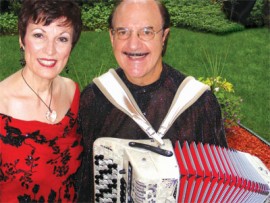 Westchester County Business Journal, by Bill Fallon August 10, 2009 “Her voice, his accordion, a business” Cover story of Mary Mancini and Mario Tacca
Westchester County Business Journal, by Bill Fallon August 10, 2009 “Her voice, his accordion, a business” Cover story of Mary Mancini and Mario Tacca
June 22, 2009 Mary Mancini and Mario Tacca Headline the Abruzzi Earthquake Benefit Show 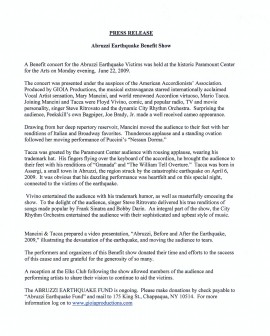
October 10, 2008 Mary Mancini Inducted into Cambridge Who’s Who Executive, Professional and Entrepreneurial Registry She has been called “the woman with the golden voice.“
One Man’s Orchestra
Blame it on the Beatles if the accordion is not getting the respect it deserves. ”I feel that the accordion is not quite understood or appreciated today,” said Mario Tacca, a champion accordion player who lives in Cortlandt Manor. ”When the Beatles came onto the scene in the mid-60’s, the electric guitar took over and the accordion, which was very popular before, went into the background.”
Mr. Tacca and his wife, Mary Mancini, make music together as a duo known as Music From the Heart. Ms. Mancini sings ”everything from lusty French ballads to opera” in eight languages, including Mandarin, the language she sang in on a recent trip to China.
The Italian-born and French-trained Mr. Tacca plays both a traditional accordion and a digital one that can produce unexpected sounds. ”The accordion is a tremendously interesting and versatile instrument that can sound like an orchestra,” Ms. Mancini said. The pair perform widely at festivals and conventions in places like Milwaukee and Las Vegas, as well as around New York.
Mr. Tacca often plays Saturdays and Sundays at the Magnanini Winery, a restaurant in Walkill. The duo can be heard May 16 at 3 p.m. at the Academic Arts Theater of Westchester Community College in Valhalla in a show called ”Mario Tacca and Friends Accordion Spectacular: A Parade of Champions.” Tickets are $20 and $17. Information: (914)785-6790.
Against the Odds, Musician Fights for Respect for the Accordion
THOUGH many people laugh at the lowly accordion, the instrument puts a different kind of smile on Mario Tacca’s face. He can make it sound like a gift from heaven. And though he understands the prejudice toward his artistic outlet, he has found bliss trying to counter the stereotype.
”It doesn’t bother me,” he said of the jokes and the derisive attitudes. ”Back in the 1950’s and 1960’s, accordions were being imported into this country by the hundreds of thousands. It was very popular. Then, in 1964, the Beatles came; all the youngsters picked up the guitar and the accordion took a back seat, so the next generation knew nothing about the accordion. Now we have to re-educate.”
In the United States, accordion icons included Lawrence Welk, Dominic Cortez and Dick Contino, who is responsible for popularizing the song ”Lady of Spain” and appeared on the Ed Sullivan show 48 times, Mr. Tacca said. The Beatles, by comparison, appeared twice. Cajun and zydeco music from Louisiana center on the accordion, as does Tex-Mex music (consider the Grammy Award winner Flaco Jimenez).
Around the world, the accordion is central to the folk music of Russia, Eastern Europe (polka, klezmer and German oom-pah), Italy, France, Ireland, Scandinavia, the Dominican Republic and parts of South America.
Two years ago, Mr. Tacca and his wife, Mary Mancini, a singer, performed in Kunming, China.
”The accordion is the most popular instrument in China,” Ms. Mancini said. ”Every time we turned on the TV, it seemed, we were on. We even had photographers chasing us. They treated us like royalty.”
Mr. Tacca led 100 young Chinese accordionists in a rendition of Johann Strauss Sr.’s ”Radetsky March” and performed with the 80-piece Kunming Symphony. A bootlegged DVD of the concert has circulated all over the country, Ms. Mancini said, ”and we can’t collect a dime.”
”You can’t fight them; they can do what they want,” she added. ”Then they say, ‘Give us your CD’s, we can produce them here.’ We said, ‘No way.’ ”
The couple support themselves selling CD’s they record in the basement of their home in Cortlandt Manor and touring for 200 days a year. Mr. Tacca also tutors students. The couple have composed original songs but their repertory usually consists of original arrangements of classical, sacred, pop and ethnic works, and Broadway standards. Ms. Mancini, who is classically trained, sings in eight languages.
In concert, Mr. Tacca conducts and plays keyboards and the accordion. Depending on the budget and the venue, backup musicians include a guitarist, a bassist, a drummer and a horn section. They also travel with a professional sound man.
The two met 30 years ago in local music circles. Born in Peekskill, Ms. Mancini never left the area. Mr. Tacca is from the Abruzzi region of Italy, though his family moved to France when he was 6. His accent reflects the dual upbringing. He learned the accordion in France after hearing one of his brother’s friends play. The family came to the United States in the 1950’s, some members settling in Philadelphia and others in Peekskill, where Mr. Tacca came in 1959.
”I didn’t know a word of English and met some accordionists who spoke Italian and French who helped me learn,” he said. Jumping into the American Accordionists Association’s competition circuit, he won the 1962 international championship held at Carnegie Hall.
Mr. Tacca and Ms. Mancini married in 1975, and they began performing locally. Mr. Tacca has produced several concerts billed as Accordion Extravaganzas at the Paramount Theater in Peekskill.
”They’re international stars who enhance Italian heritage here,” said Gabriel Di Rubbo, past president of the Yorktown-based Circolo Da Vinci. ”In Italy, many of the folk songs originated along with the accordion. I think that people are beginning to recognize this. As soccer was once a minor sport in this country and has now become more mainstream here, so it is with the accordion. It has become an instrument not only of the past but of the present.”
Over the last decade, the couple have branched out from their local roots.
”We used to do more locally, but we started traveling because the accordion is much more popular in other parts of the country,” Mr. Tacca said. ”New York is so congested with the arts, but if you get out of the area things are not the same. There are lots of accordion clubs from Ohio to the West Coast.”
Mr. Tacca owns four $15,000 custom-made chromatic button accordions without keyboards, one of which is embedded with dozens of flashing lights that flicker like colored strobes when he plays. Two of his instruments are outfitted with devices, that operate like mini-synthesizers and give him the ability to recreate hundreds of sound effects and tones of other instruments.
Like a fluid singer taking a breath, he’s adept at working the bellows so that listeners barely notice. Buttons beneath his left hand add a heavy bass heft while his right hand works five rows of buttons that put 64 notes at his fingertips. He adds flashy flourishes to the melody by skipping over the buttons like a heavy metal guitarist in the middle of a manic solo.
Mr. Tacca has fought the odds and gained a measure of fame on an instrument whose lack of popularity is rivaled only by the bagpipes or the bassoon. (A typical joke from the Accordionists Worldwide Web site: ”What is a bassoon good for? Kindling for an accordion fire.”)
”Some people get converted when Mario is in concert,” Ms. Mancini said. ”People come up after the show and say, ‘I just developed a greater respect for the accordion.’ ”
This is what people around the world have been saying about Mary and Mario
“Mary Mancini deserves the reputation of ‘elite of the International Music Circuit.’ Through her music we see her heart is smiling; Like a stream flowing into the distance, like a skylark in the dark, appealing to the dawn!” Spring City Evening News – People’s Republic of China
“The exceptional voice of Mary Mancini, American singer, conquered the public of Froidcul in the Church of St. Segolene. The purity of her voice, the ease with which she seemed to interpret the most difficult pieces showed that Mary Mancini is a great artist!” Le Republicain Lorrain – France Journal – Alsace Lorraine, France
“The best female vocalist alive today – sensational – Mary Mancini is a marvelous talent – a lightning bolt! Her reputation of being able to captivate an audience is as legendary in Europe and across the world as it is here at home.” Italian Tribune News – New Jersey
“Mary Mancini is superb! She is an outstanding world class artist!” Home News and Times – Westchester County, NY
“Mario Tacca is a true Master of his instrument.” Spring City News – People’s Republic of China
“Mario Tacca – the invincible Master – unreachable!” Accordiana, Chicago, IL
“Mario Tacca combines the technique and the musicianship of a true performer.” Hector Guzman – Music Director Plano, Irving and San Angelo Symphony Orchestras, Texas
“Mario Tacca, an accordionist of the highest level – his fingers seem to fly over the keyboard – his musical interpretations were received with the great recognition he deserved!” Le Republicain Lorrain – France Journal, Alsace Lorraine, France

